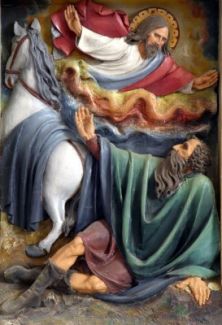 When I looked at today’s readings, I’ll admit I let out a little sigh. This was one of the longest selections of text I’d ever needed to analyze for this blog! Still, I concluded that it must be important, since the Church generally uses more Scripture on days that are particularly significant, such as Palm Sunday and Easter. And I was correct; today’s readings are pretty important.
When I looked at today’s readings, I’ll admit I let out a little sigh. This was one of the longest selections of text I’d ever needed to analyze for this blog! Still, I concluded that it must be important, since the Church generally uses more Scripture on days that are particularly significant, such as Palm Sunday and Easter. And I was correct; today’s readings are pretty important.
Of course, I quickly realized that the readings were not as large as they seemed. The first reading offers two meaty selections — Acts 22:3-16 and Acts 9:1-22 — but the assumption is that only one of them will be read at Mass. Still, revolving as they do around Paul’s conversion — for today is the Feast of the Conversion of Saint Paul — there’s a lot going on.
I obviously knew the story of Paul’s realization of the Truth and how he came to Jesus, but — reading these Bible passages with fresh eyes — I was startled to gain some new insight.
The first proposed reading from Acts 22 begins with Paul addressing the Jews of Jerusalem. Paul then details how he was both terrible and terribly effective in his persecution of early Christians. Notice how these are confessions to the crowd. He doesn’t revel in his prior misdeeds. But he doesn’t skirt around them saying, “Oh, I did some things I’m not proud of,” or try to obfuscate the truth about his past. He admits, plainly, “I persecuted this Way to death, binding both men and women and delivering them to prison.”
I’ve seen many people give witness testimony to the Truth about Christ, to audiences of Catholics and would-be Catholics. I’m not at liberty to share specifics of their stories — since the circumstances of these tales generally came with an assurance of discretion among the audience — but I have heard believers speak plainly about what they have done wrong previously, how they have acted contrary to God’s plan for them, and how they came to find Christ.
These stories have always resonated with the listeners because they show the power of Christ’s redemption and forgiveness. It shows, firsthand, that it is always possible to find a new life in Christ. Even if you’ve fallen to substance abuse, suffered from grievously failed relationships, alienated family and friends with selfishness, or contemplated or even attempted self-harm, Christ is ready and eager to shepherd you to a new path.
That is the power of personal stories, of confessing one’s failings before a group of believers. (I’ve also drawn upon my personal history when talking about Christ, but I’ve lived nowhere near the level of hardship or challenge of many whose stories have touched me.) One of the earliest, most-powerful examples of this proselytizing in action is in Paul’s address to the crowd.
The second thing that struck me about today’s readings takes place after Jesus confronts Paul, commanding him to leave his old life and follow Christ. Paul was struck blind by the encounter, and he needed to be guided to Damascus. In Damascus, the Lord appears to the disciple Ananias and tells him to visit Paul and lay hands on him, and then his sight will be restored.
Ananias is reluctant: “Lord, I have heard from many sources about this man, what evil things he has done to your holy ones in Jerusalem. And here he has authority from the chief priests to imprison all who call upon your name.” But the Lord tells him that Paul is “a chosen instrument of mine to carry my name before Gentiles, kings, and children of Israel.” Ananias then does what the Lord commands and visits Paul, laying his hands on Paul: “Immediately things like scales fell from his eyes and he regained his sight.”
Notice how, in this case, Paul was already on the road to Christ. He’d had a personal encounter and seemed ready to believe. Yet it was another believer who needed to bring him fully into the light . . . literally! Again, I’ve witnessed several times over my life how someone has had the seeds of the faith planted in them, but another believer needed to continue God’s work and bring those seeds to fruition, turning it into a lasting love of God.
Keep an eye out for those moments where you can serve as Ananias for someone else. Perhaps you can help as someone to talk to or answer questions for the fledgling believer. Perhaps you can act as a more active assistant, offering a ride to church or providing a copy of a Bible or collection of reflections that has been particularly useful for you.
Paul’s story of conversion is striking, both for its dramatic nature and how important Paul became to the early Church. But in many ways our own paths can be reflected in Paul’s journey, whether sharing our own failings as evidence of Christ’s power or helping others become the useful servants they’re called to be. Today’s Gospel selection is from Mark, where Jesus appears to the Eleven after his resurrection: “Go into the whole world and proclaim the Gospel to every creature. These signs will accompany those who believe: . . . They will lay hands on the sick, and they will recover.” Ananias did, indeed, lay hands on Paul, and Paul went on to proclaim the Gospel to the world. And Christ’s command can be our own, whether helping to spread the Word or helping others through your actions.
